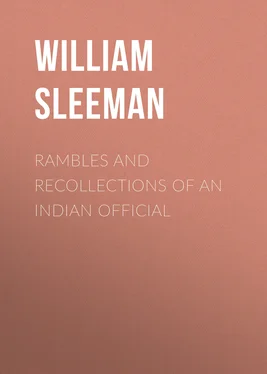William Sleeman - Rambles and Recollections of an Indian Official
Здесь есть возможность читать онлайн «William Sleeman - Rambles and Recollections of an Indian Official» — ознакомительный отрывок электронной книги совершенно бесплатно, а после прочтения отрывка купить полную версию. В некоторых случаях можно слушать аудио, скачать через торрент в формате fb2 и присутствует краткое содержание. Жанр: Путешествия и география, История, foreign_edu, foreign_antique, foreign_prose, на английском языке. Описание произведения, (предисловие) а так же отзывы посетителей доступны на портале библиотеки ЛибКат.
- Название:Rambles and Recollections of an Indian Official
- Автор:
- Жанр:
- Год:неизвестен
- ISBN:нет данных
- Рейтинг книги:4 / 5. Голосов: 1
-
Избранное:Добавить в избранное
- Отзывы:
-
Ваша оценка:
- 80
- 1
- 2
- 3
- 4
- 5
Rambles and Recollections of an Indian Official: краткое содержание, описание и аннотация
Предлагаем к чтению аннотацию, описание, краткое содержание или предисловие (зависит от того, что написал сам автор книги «Rambles and Recollections of an Indian Official»). Если вы не нашли необходимую информацию о книге — напишите в комментариях, мы постараемся отыскать её.
Rambles and Recollections of an Indian Official — читать онлайн ознакомительный отрывок
Ниже представлен текст книги, разбитый по страницам. Система сохранения места последней прочитанной страницы, позволяет с удобством читать онлайн бесплатно книгу «Rambles and Recollections of an Indian Official», без необходимости каждый раз заново искать на чём Вы остановились. Поставьте закладку, и сможете в любой момент перейти на страницу, на которой закончили чтение.
Интервал:
Закладка:
While at Narsinghpur, Sleeman received on the 24th April, 1824, brevet rank as Captain. In 1825, he was transferred, and on the 23rd September of the following year, was gazetted Captain. In 1826, failure of health compelled him to take leave on medical certificate. In March, 1828, Captain Sleeman assumed civil and executive charge of the Jabalpur (Jubbulpore) District, from which he was transferred to Sāgar in January, 1831. While stationed at Jabalpur, he married, on the 21st June, 1829, Amélie Josephine, the daughter of Count Blondin de Fontenne, a French nobleman, who, at the sacrifice of a considerable property, had managed to escape from the Revolution. A lady informs the editor that she remembers Sleeman's fine house at Jabalpur. It stood in a large walled park, stocked with spotted deer. Both house and park were destroyed when the railway was carried through the site.
Mr. C. Eraser, on return from leave in January, 1832, resumed charge of the revenue and civil duties of the Sāgar district, leaving the magisterial duties to Captain Sleeman, who continued to discharge them till January, 1835. By the Resolution of Government dated 10th January, 1835, Captain Sleeman was directed to fix his head-quarters at Jabalpur, and was appointed General Superintendent of the operations for the Suppression of Thuggee, being relieved from every other charge. In 1835 his health again broke down, and he was obliged to take leave on medical certificate. Accompanied by his wife and little son, he went into camp in November, 1835, and marched through the Jabalpur, Damoh, and Sāgar districts of the Agency, and then through the Native States of Orchhā, Datiyā, and Gwālior, arriving at Agra on the 1st January, 1836. After a brief halt at Agra, he proceeded through the Bharatpur State to Delhi and Meerut, and thence on leave to Simla. During his march from Jabalpur to Meerut he amused himself by keeping the journal which forms the basis of the Rambles and Recollections of an Indian Official . The manuscript of this work (except the two supplementary chapters) was completed in 1839, though not given to the world till 1844. On the 1st of February, 1837, in the twenty- eighth year of his service, Sleeman was gazetted Major. During the same year he made a tour in the interior of the Himalayas, which he described at length in an unpublished journal. Later in the year he went down to Calcutta to see his boy started on the voyage home.
In February, 1839, he assumed charge of the office of Commissioner for the Suppression of Thuggee and Dacoity. Up to that date the office of Commissioner for the Suppression of Dacoity had been separate from that of General Superintendent of the measures for the Suppression of Thuggee, and had been filled by another officer, Mr. Hugh Eraser, of the Civil Service. During the next two years Sleeman passed much of his time in the North-Western Provinces, now the Agra Province in the United Provinces of Agra and Oudh, making Murādābād his head-quarters, and thoroughly investigating the secret criminal organizations of Upper India.
In 1841 he was offered the coveted and lucrative post of Resident at Lucknow, vacant by the resignation of Colonel Low; but that officer, immediately after his resignation, lost all his savings through the failure of his bankers, and Sleeman, moved by a generous impulse, wrote to Colonel Low, begging him to retain the appointment.
Sleeman was then deputed on special duty to Bundēlkhand to investigate the grave disorders in that province. While at Jhānsī in December, 1842, he narrowly escaped assassination by a dismissed Afghan sepoy, who poured the contents of a blunderbuss into a native officer in attendance. 4 4 The incident is described in detail in a letter dated December 18, 1842, from Sleeman to his sister Mrs. Furse. Captain J. L. Sleeman has kindly furnished me with a copy of the letter, which is too long for reproduction in this place.
During the troubles with Sindhia which culminated in the battle of Mahārājpur, fought on the 29th December, 1843, Sleeman, who had become a Lieut.-Colonel, was Resident at Gwālior, and was actually in Sindhia's camp when the battle unexpectedly began. In 1848 the Residency at Lucknow again fell vacant, and Lord Dalhousie, by a letter dated 16th September, offered Sleeman the appointment in the following terms:
The high reputation you have earned, your experience of civil administration, your knowledge of the people, and the qualifications you possess as a public man, have led me to submit your name to the Council of India as an officer to whom I could commit this important charge with entire confidence that its duties would be well performed. I do myself, therefore, the honour of proposing to you to accept the office of Resident at Lucknow, with especial reference to the great changes which, in all probability, will take place. Retaining your superintendency of Thuggee affairs, it will be manifestly necessary that you should be relieved from the duty of the trials of Thugs usually condemned at Lucknow.
In the hope that you will not withhold from the Government your services in the capacity I have named, and in the further hope of finding an opportunity of personally making your acquaintance,
5 5 This letter is printed in full in the Journey through the Kingdom of Oude , pp. xvii-xix.
The remainder of Sleeman's official life, from January, 1849, was spent in Oudh, and was chiefly devoted to ceaseless and hopeless endeavours to reform the King's administration and relieve the sufferings of his grievously oppressed subjects. On the 1st of December, 1849, the Resident began his memorable three months' tour through Oudh, so vividly described in the special work devoted to the purpose. The awful revelations of the Journey through the Kingdom of Oude largely influenced the Court of Directors and the Imperial Government in forming their decision to annex the kingdom, although that decision was directly opposed to the advice of Sleeman, who consistently advocated reform of the administration, while deprecating annexation. His views are stated with absolute precision in a letter written in 1854 or 1855, and published in The Times in November, 1857:
We have no right to annex or confiscate Oude; but we have a right, under the treaty of 1837, to take the management of it, but not to appropriate its revenues to ourselves. We can do this with honour to our Government and benefit to the people. To confiscate would be dishonest and dishonourable. To annex would be to give the people a government almost as bad as their own, if we put our screw upon them ( Journey , ed. 1858, vol. i, Intro., p. xxi).
The earnest efforts of the Resident to suppress crime and improve the administration of Oudh aroused the bitter resentment of a corrupt court and exposed his life to constant danger. Three deliberate attempts to assassinate him at Lucknow are recorded.
The first, in December, 1851, is described in detail in a letter of Sleeman's dated the 16th of that month, and less fully by General Hervey, in Some Records of Crime , vol. ii, p. 479. The Resident's life was saved by a gallant orderly named Tīkarām, who was badly wounded. Inquiry proved that the crime was instigated by the King's moonshee.
The second attempt, on October 9, 1853, is fully narrated in an official letter to the Government of India (Bibliography, No. 15). Its failure may be reasonably ascribed to a special interposition of Providence. The Resident during all the years he had lived at Lucknow had been in the habit of sleeping in an upper chamber approached by a separate private staircase guarded by two sentries. On the night mentioned the sentries were drugged and two men stole up the stairs. They slashed at the bed with their swords, but found it empty, because on that one occasion General Sleeman had slept in another room.
Читать дальшеИнтервал:
Закладка:
Похожие книги на «Rambles and Recollections of an Indian Official»
Представляем Вашему вниманию похожие книги на «Rambles and Recollections of an Indian Official» списком для выбора. Мы отобрали схожую по названию и смыслу литературу в надежде предоставить читателям больше вариантов отыскать новые, интересные, ещё непрочитанные произведения.
Обсуждение, отзывы о книге «Rambles and Recollections of an Indian Official» и просто собственные мнения читателей. Оставьте ваши комментарии, напишите, что Вы думаете о произведении, его смысле или главных героях. Укажите что конкретно понравилось, а что нет, и почему Вы так считаете.












